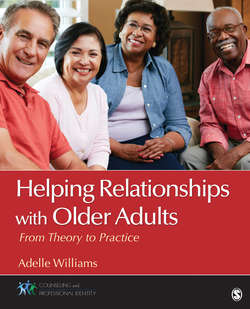Читать книгу Helping Relationships With Older Adults - Adelle M. Williams - Страница 87
На сайте Литреса книга снята с продажи.
Optimizing the Vision for Aging
ОглавлениеAt varying levels of consciousness, people imagine what it means to grow older. These imaginings need to be evaluated in terms of their accuracy and whether they represent how the person wants to age. Discussion, art therapy, relevant print and audiovisual materials, and interviewing are ways of making older people more conscious of their own thoughts and feelings about aging, expanding their notions as to what is possible, and then enlightening them on what they could be doing to achieve it. Gerontological counselors should take some of the following concerns into account when working with older adults. These concerns include losing their health, their ability to care for themselves, and their mental capacity; running out of money; finding meaning in older age; managing loss and grief; navigating sex and impotency; and sustaining marriage in the later years.
A key element is helping people realize what later life will be is highly contingent on current practices. Neugarten (1971) said, “Most of us have a half-conscious and irrational fear that one day we will find ourselves old, as if suddenly we will fall off a cliff, and that what we will be then has little to do with what we are now” (p. 45). Appreciating this—and after the investigation and evaluation of current wellness levels and practices in the areas of physical health, emotions, nutrition, play, spirituality, finances, family, and friends—clients should have an expanded vision of possibilities for successful aging and should know what wellness practices will help them have greater control over their future. People need to be empowered to prescribe a life course that best fits who they are and who they want to become. A sense of being in control is essential. Guided Practice Exercise 3.10 encourages counselors to examine their strengths and weaknesses as they relate to working with older clients. Developing the right knowledge, skills, and attitudes is critical to effectively provide services to an elderly client population.
Guided Practice Exercise 3.10
You have been trained to provide counseling services to clients from young adulthood through middle age. Your knowledge of older adults comes primarily from your experiences with your grandparents and their friends. You are now expected to provide counseling services to an older clientele (65+). How would you prepare yourself to work with this client population? Do you believe you can use the same strategies and interventions you have used previously with these older clients?
Change will occur as people control their lives and work to implement and optimize their vision for successful aging. It will also occur because living and aging means that the body changes, friends and relatives die, and many aspects of community and society are transformed. It is imperative to provide older adults with conceptual models and coping skills for handling change. These strategies should help them deal with the uncomfortable feelings that often accompany change and thus make them more effective with their change efforts. Competent counselors are already knowledgeable in these areas and need only to target their professional abilities to the area of promoting successful aging.
